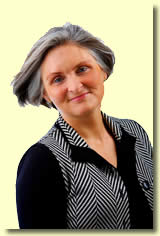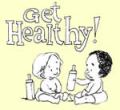|
Menopause:
Changing doesn't have to be so hard
Menopause, or the
permanent end of menstruation and fertility, is a natural biological process, not a medical illness. process, not a medical illness.
It shouldn't be something to dread but to embrace. A change, a new
beginning. Life is what you make of it. Menopause is like a stepping
stone into the next part of the journey that is your life!
A natural part of life should not cause so many problems. If we give
our body what it needs; it will take care of and even heal itself.
There are many stories that prove this. Norman Cousins laughed himself
into good health, After receiving x-ray burns to the extent he was told
to have his arm and leg amputated to the joint, Dr. Shaklee focused on
good health with pure water, good exercise, and good nutrition. After
three years, his body was healed. (The Shaklee Story by Robert L Shook)
The body is hard to destroy but due to lack of proper nutrition and
exercise, the natural parts of life become problems.
Menopause is a change in the body, the hormones, and everything
pertaining to child bearing. It is also said it takes several years for
the “bad” things to happen to our body after years
of abuse. Menopause is not bad, but the symptoms might be due to past
“abuse”, not taking care of oneself.
One of the most common symptoms of
menopause is Hot Flashes. They occur in about two thirds of American
women.
Web MD defines a hot flash as a momentary sensation of heat that may be
accompanied by a red, flushed face and sweating. The cause of hot
flashes is not known, but may be related to changes in circulation.
The severity and duration of hot flashes varies among women. Some women
have hot flashes for a very short time during menopause. Other women
may have hot flashes -- at least to some degree -- for life. Generally,
hot flashes are less severe as time passes.
While it may not be possible to completely eliminate hot flashes their
affects can be reduced by following some of the suggestions on this
page.
Avoiding certain triggers such as stress, caffeine, spicy foods,
alcohol, tight clothes and cigarette smoke can also help many women get
through this time of change.
Some women have no problems “changing” speeds so to
speak. If there is a problem, it is my opinion that medications are NOT
the way to go.
Medications do not a healthy cell build.
Instead, go for the healthy diet which includes lots of purified water
and an excellent fiber. Get one that actually helps the body get rid of
the fat in the blood stream. Once again, what company and products are
you dealing with? Does their research tell you anything?
The Mayo Clinic recommends the following tips to help reduce or
eliminate some of the symptoms related to menopause. 
- Eat Well. Eat a balanced diet that
includes a variety of fruits, vegetables and whole
- Don't smoke. Smoking increases your risk of
heart disease, stroke, osteoporosis, cancer and a range of other health
problems. It may also increase hot flashes and bring on earlier
menopause. It's never too late to benefit from stopping smoking.
- Exercise regularly. Get
at least 30 minutes of moderate-intensity physical activity on most
days to protect against cardiovascular disease, diabetes, osteoporosis
and other conditions associated with aging. More vigorous exercise for
longer periods may provide further benefit and is particularly
important if you are trying to lose weight.
Exercise can also
help reduce stress.
There is
no question we need exercise.
Research
shows that exercise alone can alleviate hot flashes. In one study,
aerobic exercise reduced the severity of hot flashes in 55% of
postmenopausal women.
You
don’t have to join a gym. Just take the dog, a friend, or
your husband for a walk. Manage the stress.
Other
things we recommend are:
- Add
the basic nutritional supplements of a cell building
multi-vitamin.
- Take a
water washed, non GMO soy
protein. Christiane
Northup, MD, in her book The Wisdom of Menopause, cites research that
indicates that women who ate 60 grams of soy protein per day in the
form of a powdered drink mix had a 45% reduction in hot flashes after
12 weeks.
- Supplement
your health regimen with a unique complex for menopause that
has the phytonutrients that provides ingredients the body can make into
hormones it needs. This product also has six other much needed herbs
that help relieve hot flashes, helps improve bone strength and density,
and helps detoxify the liver.
- Women
going through menopause may find relief from their symptoms if they
include botanicals such as phytoestrogens in their diet.
- Phytoestrogens
are substances found in plant-based foods that are thought to have weak
estrogen-like effects. They may work in the body like a weak form of
estrogen. Some may help lower cholesterol levels and have been
suggested to relieve hot flashes and night sweats.
- Get
enough calcium.
Eating
and drinking 2 to 4 servings of dairy products and calcium-rich foods a
day will help ensure that you are getting enough calcium in your daily
diet. Calcium is found in dairy products, fish with bones such as
sardines and canned salmon, broccoli and legumes.
- Pump
up your iron intake. Eating at least 3 servings of iron-rich foods a
day will help ensure that you are getting enough iron in your daily
diet. Iron is found in lean red meat, poultry, fish, eggs, leafy green
vegetables, nuts and enriched grain products.

- Get
enough fiber. Help yourself to foods high in fiber such as whole-grain
breads, cereals, pasta, rice, fresh fruits and vegetables.
- Eat
fruits and vegetables. Include at least 2-4 servings of fruits and 3-5
servings of vegetables in your daily diet.
- Read
labels. Use the package label information to help you to make the best
selections for a healthy lifestyle.
- Drink
plenty of water. This will help you stay hydrated.
- Maintain
a healthy
weight. Lose
weight if you are overweight by cutting down on portion sizes and
reducing foods high in fat, not by skipping meals.
You may
have heard of — or even tried — other dietary
supplements, such as dong quai, licorice, chasteberry, evening primrose
oil and wild yam (natural progesterone cream). Although some might
swear by these remedies, scientific evidence of their safety and
effectiveness is lacking.
Hormone
Therapy (or Hormone Replacement Therapy) is another medical solution
for menopause. While HT may help many women get through menopause, the
treatment is not risk free. Known health risks include:
- An increased risk of endometrial cancer
(if a woman still has her uterus and is not taking progesterone along
with estrogen).
- Increased risk of blood clots.
- Increased risk of stroke.
- Increased risk of gallbladder disease.
- Increase in blood pressure in some women.
- Increased risk of larger, more invasive
breast cancers (combination HRT only)
Be
careful of what you use. Our goal is to achieve a healthy body now and
in the future. Don’t trade long term wellness for temporary
relief.
Remember;
check the clinical studies on the product. Need help with that?
Contact me.
So if the
symptoms of menopause are driving you mad. How mad do you have to get
before you believe in natural health, not medication?
Think
about it!
ADD TO YOUR SOCIAL BOOKMARKS:
 Blink Blink
 Del.icio.us Del.icio.us  Digg Digg
 Furl Furl
 Google Google
 Simpy Simpy
 Spurl Spurl
 Technorati Technorati
 Y!
MyWeb Y!
MyWeb
|
|


 process, not a medical illness.
process, not a medical illness. 


